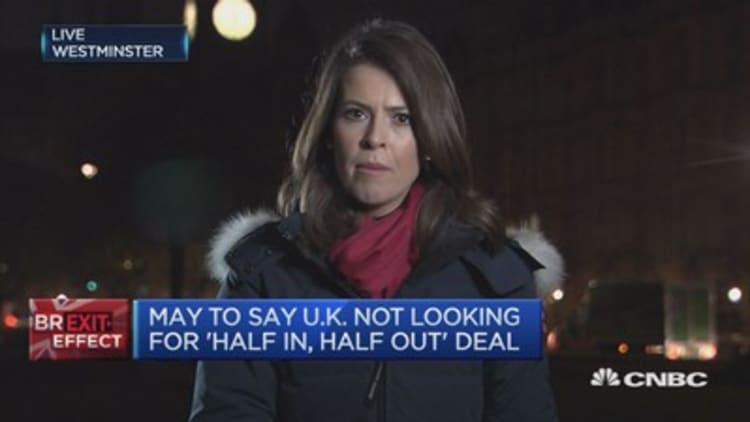U.K. Prime Minister Theresa May is set to present her 12 priorities for the upcoming Brexit negotiations with the European Union Tuesday. However market-watchers are warning that rather than answering questions, the speech could raise a set of new ones.
Media reports suggest that in her speech May will give up on access to the EU's single market, which allows U.K. business to trade freely and at lower costs with EU countries, in order to regain full control of immigration.
However, analysts remain worried on the uncertainty regarding the British departure from the EU, saying that exiting the single market raises a raft of other questions.
"We think indicating an approach to the negotiations that leads to a "clean break/hard Brexit" from the EU will provide just as many more new questions as those it answers about the future EU/UK relationship," Nomura said in a research note on Monday.
The divorce procedure is complex. Even if May confirms that Britain will not seek access to the single market, it is not certain whether Britain will work towards a trade deal with the EU, which would take years to negotiate, or trade only based on existing World Trade Organization rules.
Other points to answer include the future of EU citizens who are already working in the U.K. as well as a border between Northern Ireland and Ireland.
"Even with May providing slightly greater clarity – or rather publicly embracing the inevitable (losing access to the single market) – the question of a transition deal will likely remain unresolved for the foreseeable future," Carsten Nickel, deputy director of research at Teneo Intelligence said in a note on Monday.

A transition deal would allow Britain and the EU to make a smoother move to post-Brexit while respecting the deadlines set out in EU treaties.
"One reason is that the EU-27 will likely insist on discussing divorce proceedings first. The busy electoral calendar across Europe in 2017 further adds to this. In that sense, talks about the future EU-UK relationship might not get serious before 2018," Nickel added.
There are key elections in several key EU countries such as Germany, France and the Netherlands.
Leaving the single market also raises the questions "of the extent and the timing of a UK retreat from the bloc's customs union – enabling the UK to independently strike global trade deals – as the real benchmark for the severity of Brexit," Nickel said.
"Additional administrative burdens on businesses and the restoration of a border between Northern Ireland and the Republic of Ireland are among the problematic effects," he added.


